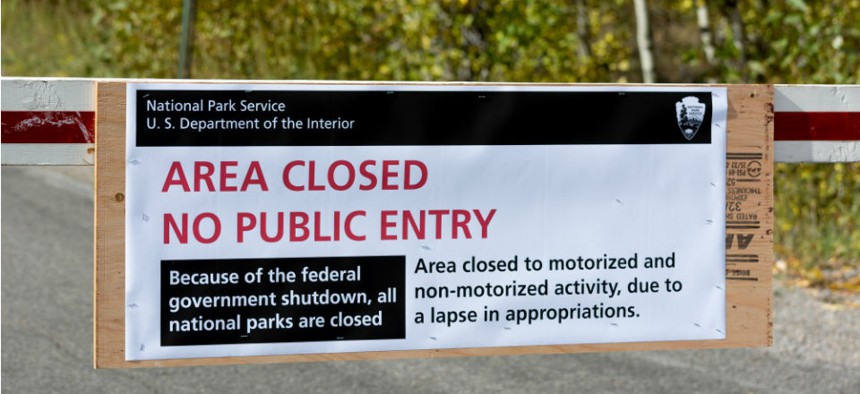
Philip Bird LRPS CPAGB / Shutterstock.com
Feds Who Worked During Shutdown Could Still Receive Bonus Pay
First ruling in shutdown lawsuit is mostly favorable for those forced to work.
The government violated federal labor laws when it delayed payments to employees during last year’s shutdown, a federal judge has ruled.
U.S. Court of Federal Claims Judge Patricia Campbell-Smith denied on July 31 the federal government’s motion to dismiss a lawsuit originally filed by five Bureau of Prisons employees. Those workers sought damages after they were forced to work during the two-week shutdown in October 2013, but did not receive their full paychecks until federal agencies reopened.
The judge ruled the government was in violation of the 1938 Fair Labor Standards Act when it delayed payments for hours worked between Oct. 1 and Oct. 5 to most of the 1.3 million employees forced to report during the shutdown. Campbell-Smith rejected the workers’ claim that even employees designated as exempt by the FLSA -- such as teachers, nurses and high-level managers -- were entitled to damages. She also said employees who earned more than the weekly minimum wage of $290 from their paycheck by working that week before the shutdown -- Sept. 29 (a Sunday) and Sept. 30 -- were not treated in violation of labor laws.
Still, the government violated the FLSA for the vast majority of federal employees who worked during the shutdown, she ruled. Mehri & Skalet, the law firm representing the 2,000 employees who have signed on to the collective-action suit, argued federal employees incurred damages because the delayed paychecks left them unable to pay bills and medical expenses. The government unsuccessfully contended during oral arguments any late fees incurred by federal workers during the shutdown were made due to “poor financial management decisions.”
The judge instead offered sympathy for those affected.
“The court notes that at least some government employees, who may be plaintiffs herein, were working at the GS-04 or GS-05 levels, and had annual salaries starting around $28,000 in 2013,” Campbell-Brown wrote in her ruling. “Such salaries leave families a narrow margin, particularly when -- as plaintiffs in this action have described -- child care expenses continue and unexpected health-related expenses arise.”
Campbell-Brown did not rule whether the plaintiffs were entitled to “liquidated damages,” or financial compensation, from the federal government. Plaintiffs are seeking compensation of $7.25 -- the federal minimum wage -- times the number of hours worked between Oct. 1 and Oct. 5, the period in which paychecks were delayed. This amounts to $290 for employees who worked 8-hour days, plus any overtime they are due.
Unlike furloughed workers, employees who reported to work during the shutdown were guaranteed retroactive pay. However, the plaintiffs in Martin et. al. v. The United States argue because the excepted workers faced hardships during the shutdown, such as an inability to pay bills on time, they should receive extra compensation.
The court decided to give the government more time to prove it is not liable to provide financial compensation to the plaintiffs. It also gave Uncle Sam until Sept. 2 to contest the plaintiffs’ claim the case should be certified as a collective action.
Mehri & Skalet previously filed a motion to send a notice to all federal employees who worked during the shutdown, explaining their eligibility to join the lawsuit. The court will rule on that motion now that it has rejected the government’s motion to dismiss.
The Justice Department can still opt to appeal the ruling, Mehri & Skalet said. Campbell-Brown said that a determination on whether the feds will receive financial compensation “will come later on summary judgment or at trial.”
Heidi Burakiewicz, an attorney with Mehri & Skalet, said the firm expects a ruling on sending a notice to all affected employees shortly after the Sept. 2 deadline, but it does not anticipate a ruling on damages “for at least several more months.”
(Image via Philip Bird LRPS CPAGB / Shutterstock.com)
NEXT STORY: Retirement Savings Funds Hit a Slump in July







